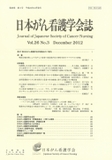Japanese
English
- 販売していません
- Abstract 文献概要
- 参考文献 Reference
- サイト内被引用 Cited by
要旨
本研究の目的は,食道発声法の獲得を促すケアモデルを喉頭全摘出術により失声した患者に適用し,ケアモデルの有効性を評価することである.研究デザインは不等価コントロール群事前事後テストデザインとした.対象は,食道発声法訓練(以下,訓練)を受けて1週間程度経過したケアモデル適用群(以下,適用群)10名,非適用群12名であった.適用群は訓練を開始して1週間程度経過時,およびその後1カ月間ケアモデルを実施した後の2回,非適用群はケアモデルを実施せず,適用群と同様の時期に2回,訓練に対するストレスとコーピング,自己練習状況,発声音数,心理的影響要因,心理的適応状態に関するデータ収集を行った.分析はt検定,対応のあるt検定,反復測定による分散分析を行った.結果,「発声音数」に介入と調査時期の交互作用がみられた.これは,対象者が頸部や肩をリラックスさせるイメージ法や筋弛緩法を行うことで,食道内への空気の取り込みが容易になり,発声しやすくなったためと思われる.また,対象者が研究者と話し合うことにより,自宅での自己練習方法を明確にしたうえで自己練習できたことも「発声音数」の向上につながったのではないかと思われる.「練習頻度」,「自己練習時間」,「相互支援型コーピング」は調査時期による主効果がみられた.これらについては,食道発声教室において訓練を継続することにより向上したと考えられる.
Abstract
The aim of this study was to evaluate the efficacy of a care model that assists patients with aphonia resulting from total laryngectomy to master the esophageal speech method. A study using a pretestposttest design with a nonequivalent control group was performed to compare two groups: a group of 10 patients who were treated under an applicable care model following approximately one week of esophageal speech therapy(application group), and another group of 12 patients who were not treated under the same care model(non-application group). In the application group, a survey about "therapy-related stress and coping", "self-practice situation", "number of vocalizations", "psychological factors", and "psychological adaptation state" were conducted after approximately one week of speech therapy and again after one month of care model application. Data were also collected in the same way from the non-application group without the application of the care model. Statistical analysis using the t test, the paired t test, and repeated measures analysis of variance found an interaction effect between "number of vocalizations" and the intervention as well as the timing of the survey. This is likely because patients in the application group performed an imagery technique and a muscle relaxation method to relax the neck and shoulders, making it easier to inject air into the esophagus and to generate voice. Patients also practiced speech at home after mastering an individualized self-practice technique through conversations with a researcher about the therapy. This likely also improved the "number of vocalizations". The survey timing had a main effect on "practice frequency", "self-practice duration", and "mutually supportive coping", suggesting that continuation of therapy at the esophageal speech training center contributed to the results.
Copyright © 2012, Japanese Society of Cancer Nursing All rights reserved.


